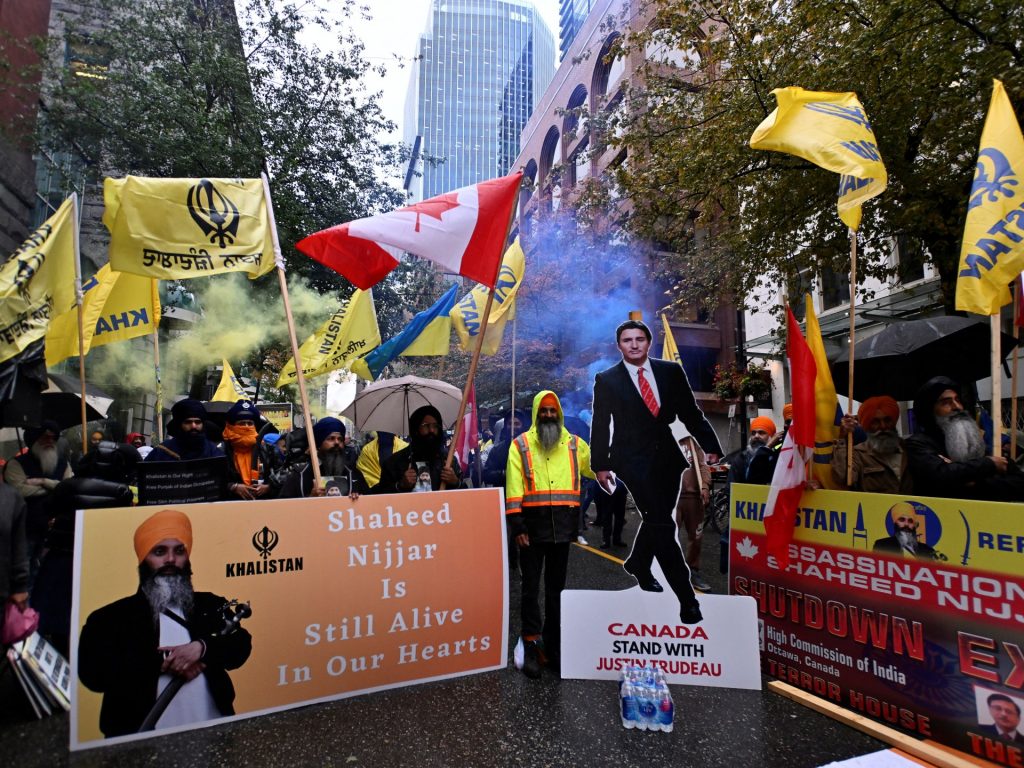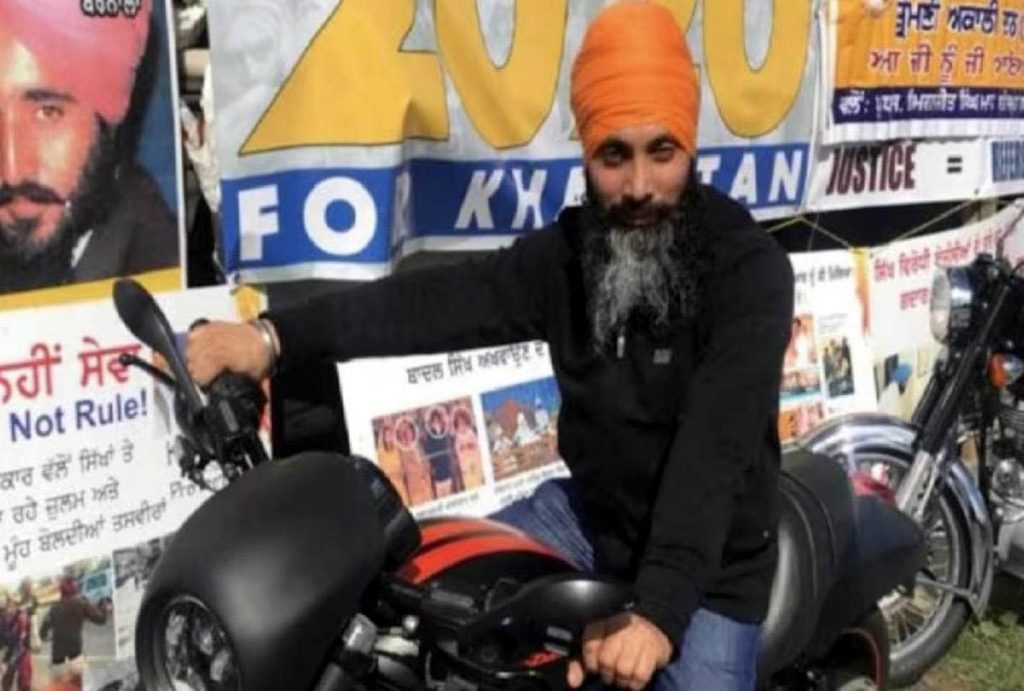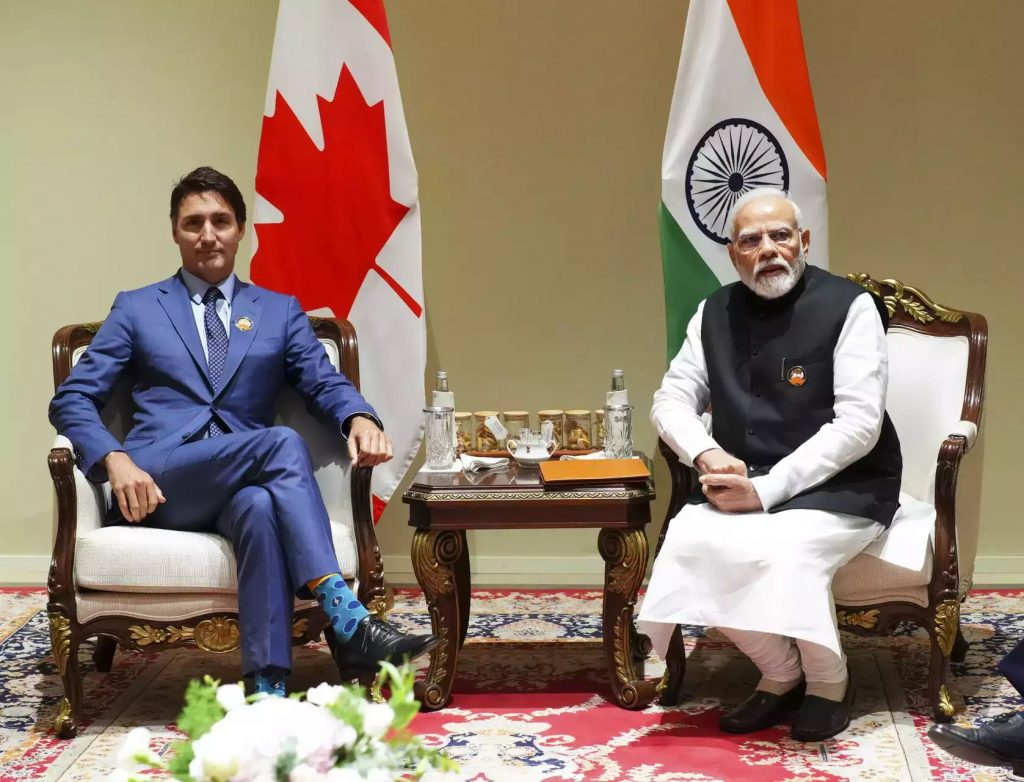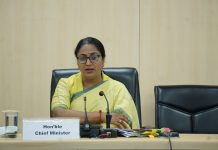
The last few months saw deepening of rift between two countries over Khalistani propaganda on Canadian soil. The tipping point came on September 18 when Canadian PM Trudeau alleged Indian government’s role in the killing of separatist Nijjar in Canada, writes Aayush Goel
While India toiled hard to ensure that the recent G 20 summit held in Delhi helped it cement its ties with partner nations, the rift between Canada and India grew wider with the latter taking up the issue of Khalistani patronisation. The diplomatic relations between two countries are continuously headed southwards since the last few months over alleged nurturing of anti-India Khalistani activities on Canadian soil. While many expected Justin Trudeau’s visit to G 20 summit to bridge the gap he, unlike other Western leaders, did not hold formal bilateral talks with the Indian Prime Minister Narendra Modi. The two leaders instead raised serious concerns with each other on the sidelines of the summit. Modi brought up “continuing anti-India activities of extremist elements in Canada”, Trudeau responded with complaints of alleged interference of Indian officials in his country’s domestic politics and insisted on freedom of speech and protest to all Canadian citizens.
The relationship hit an unprecedented rock bottom on September 18 when back from summit, Trudeau made an explosive statement before the Canadian Parliament claiming Ottawa was pursuing ‘credible allegations’ from Canadian intelligence against New Delhi for playing a role in the assassination of a prominent Canadian resident (designated Khalistani terrorist by India) Hardeep Singh Nijjar.
The Ministry of External Affairs called Trudeau’s accusation “absurd and motivated”. It said he had made similar allegations during his meeting with the PM, which had been ‘completely rejected’.

The diplomatic escalation happened quickly with Canada taking the first step of expelling a senior Indian Diplomat, India responded by expelling a Canadian diplomat based in New Delhi. India then issued a travel advisory for Indian nationals travelling to Canada, as well as a caution for the Indian community in Canada. Students, professionals, and tourists were asked to be cautious because, the advisory said, the Indian community could be targeted. While Canada went to its ‘five eye’ allies and continued to insist on intelligence inputs backing allegations, India accused it of being a “safe haven” for “terrorists, extremists and organised crime” a term generally reserved for Pakistan and Afghanistan diplomatic circles. BLS International, a visa processing firm, carried a notice from the Indian mission in Canada stating visa operations had been suspended till further notice.
India asked Canada to cut the number of its diplomats in India, saying there are more Canadian diplomats in India than there are Indian diplomats in Canada. While Canada insists on fair investigation and dependable intelligence inputs, nothing concrete has so far been shared with India, says the Ministry of External Affairs. The diplomatic row which is worsening by the day has left Indians in both nations jittery hoping for a speedy resolution.
Who was Hardeep Singh Nijjar?
While the Canadian patronage to Khalistani extremism has shadowed Indo- Canadian relations since the 1980s, the immediate provocation for the current rift has been cited as the recent murder of Khalistani terrorist Hardeep Singh Nijjar. Forty six-year old Nijjar was designated as Canada-based chief of pro-Khalistani outfit Khalistan Tiger Force (KTF) and head of the Guru Nanak Sikh Gurdwara Sahib, Surrey. It was in June this year that he was shot dead by unidentified men. The Canadian police investigations held gang rivalry as prima facie reason. However, as this murder happened three days after another UK-based outfit Khalistan Liberation Force (KLF) chief Avtar Singh Khanda died under mysterious circumstances in a hospital in Birmingham, London, UK, the Khalistanis started accusing India of orchestrating the crime. Nijjar along with Khanda had been named in the wanted list of the National Investigation Agency (NIA) just a few days before their death. Both were accused of training and planting a Khalistani separatist, who is now jailed, Waris Punjab De chief Amritpal Singh in Punjab.
Nijjar had aggressively protested against crackdown on Amritpal and accomplices in Punjab and was on the forefront of vandalisation of the Canadian high commission in March. He was in lead in the recent tableau parade which celebrated assassination of former PM Indira Gandhi. Interestingly, both Trudeau and Canadian Foreign Minister Melanie Joly called Nijjar a “Canadian citizen” in their statements though according to Indian agencies after being rejected multiple times, Nijjar got his citizenship after the first red corner notice was issued against him and communicated to Canadian authorities. Nijjar arrived in Canada in 1997 with a false identity of one “Ravi Sharma” whom he was accused of murdering.
His father and brother were taken in custody by Indian authorities for Khalistani activities and he fled to Canada. He sought asylum and was denied the same as immigration authorities found no credibility in his claims of being under threat from India. He then chose plan B of entering into ‘Marriage of Convenience’ with a woman from British Columbia who sponsored him to immigrate as her spouse. However, his application was again rejected. When India questioned Nijjar’s citizenship, Canada’s Immigration Minister Marc Miller took to social media platform X, on Tuesday (September 19), and shared a post saying Nijjar was granted citizenship on March 3, 2015. However when a red corner notice issued in 2014 was highlighted, he switched stand saying he erred on dates and Nijjar became a Canadian citizen on May 25, 2007.
Vote bank politics behind free rein to Khalistans
Canadian PM Justin Trudeau risking ties with India over Khalistani terrorist Hardeep Singh Nijjar seems to be a Deja vu of his own father’s tenure. Trudeau’s father Pierre Trudeau, who was Prime Minister from 1968 to 1979 and then from 1980 to 1984, was also known as a sympathiser of Khalistani terrorists. It was in 1982, when at the peak of the Khalistani movement, the then Canadian PM Pierre Trudeau refused to hand over Babbar Khalsa terrorist Talwinder Parmar to India. Three years later, Khalistani terrorists placed a bomb inside Indian plane Kanishka. The mid-air explosion killed 329 people. Terry Milewski’s book “Blood for Blood: Fifty Years of the Global Khalistan Project (2021)” hold ‘vote bank politics’ as a key reason behind Trudeau senior and junior’s support for decades. “It is a question often asked by Indians: why do Canadian politicians pander to Sikh extremists? The short answer is that it is not easy to look out at a throng of 100,000 on Vaisakhi Day (in Canada), knowing they might vote for you if you keep your mouth shut, and then to open it instead and risk losing the votes”, the book elaborates.
As per the 2021 Canadian census, Sikhs account for 2.1 per cent of Canada’s population, and are the country’s fastest-growing religious group. Estimates suggest that of the about 20 lakh Indian diaspora, only about 8 lakh are Sikhs. Of which, Indian estimates say, only about 1% — 8,000-9,000 people — are pro-Khalistan radicals.
But this small population of Khalistanis control 12-15 Gurudwaras, where they generate funds and organise political mobilisation by voting en bloc for Canadian political candidates. The constituencies in which they have a say are mostly in Brampton in Ontario province, and Vancouver and Surrey in British Columbia.
After India, Canada is home to the largest population of Sikhs in the world. The Sikhs have reached top political and law enforcement positions. The Trudeau government is a minority government being run in support of the New Democratic Party (NDP) headed by Khalistani sympathiser Jagmeet Singh. The NDP has 24 seats in parliament, whose support is critical for the survival of the Trudeau government. The Canadian Prime Minister therefore cannot afford to antagonise Singh, because of the extraordinary leverage his NDP enjoys with the Liberals.
After the 2019 elections, Singh and Trudeau signed a popularly known ‘confidence-and-supply agreement’ effective till 2025. Singh’s support to Trudeau during opposition’s attacks on China’s suspected interference in Canada’s elections strengthened the pact. Singh had aggressively opposed the crackdown operation against Khalistanis in Punjab, and ever since Khalistani supporters have openly been indulging in anti-India activities and protests in Canada since last few months. On the Blue Star anniversary, the Khalistanis took out a parade with afloat celebrating assassination of former PM Indira Gandhi. In addition to vandalisation of Indian diplomatic buildings and temples, Khalistanis, especially the terrorist groups like Sikhs for Justice (SFJ), have been organising referendum events. Threats are being issued to Indian diplomats and riding high on Trudeau’s support, SFJ supremo and terrorist Gurpatwant Singh Pannun has also issued threats to Hindus staying in Canada to leave immediately as they support India.
The global politics
Canada is an important strategic partner for major western powers — it is part of the G7 grouping and shares the table with the US, UK, Germany, France, Italy, and Japan. It also shares intelligence with the ‘Five Eyes’ grouping with the US, UK, Australia, and New Zealand.

All these countries are also close strategic partners of choice for India. India has the Quad partnership with the US, Australia, and Japan, and strong and growing bilateral ties with each of them. While the majority of these nations are opting out of taking any sides, the United States has said that it “publicly and privately” urged the government of India to cooperate in the Canadian investigation into Nijjar’s murder.The US also said that the investigation must proceed and called for the perpetrators to be brought to justice. US State Department spokesperson Matthew Miller emphasised the importance of a thorough investigation into Canada’s allegations. “We are deeply concerned by the allegations referenced by (Canadian) Prime Minister (Justin) Trudeau. We remain in close contact with our Canadian partners,” Miller stated. Prior to this, United States Ambassador to Canada David Cohen officially confirmed there was “shared intelligence among Five Eyes partners” which informed the Canadian Prime Minister about the Indian government’s possible involvement in the murder.
However, he did not clarify if the intelligence which informed about the investigation of the Canadian government was both human and surveillance-based, or if it had ‘Signals’ intelligence of Indian diplomats.
Punjab left in jitters
The ongoing diplomatic tension between India and Canada, suspension of Visa by the latter and Hinduphobic threats by Khalistanis has left Punjab worried. According to the Ministry of External Affairs, over 16 lakh Indians are residing in Canada and over 3 lakh are students. Canada is the top choice among Punjabis for migrating abroad due to its flexible education policy, work opportunities, easier post-graduation immigration possibilities and strong political say. Immigration, Refugees and Citizenship Canada (IRCC) welcomed 5.51 lakh new international students in 2022, of which 2.26 lakh (41%) were from India. It was followed by applicants from China, Philippines, France and Nigeria.
As many as 3.19 lakh Indian students were already living and studying in Canada as on December 31, 2022. According to government data, Canada receives a capital of around Rs 68,000 crore each year from Punjab.
As per the data of the IRCC, as many as 2,26,450 visas had been approved for the Indian students in 2022. Of these, nearly 1.36 lakh students were from Punjab last year, who were pursuing various courses of an average duration of two to three years. With the Canadian diaspora and local Punjabis worried, leaders from across party lines have moved to central leadership seeking safeguarding of Punjabis.
“At this moment the safety of Punjabis, especially students, is our top priority. I have written to the PM to ensure they are safe and away from any collateral damage of this situation. Canada is behaving like Pakistan and we need to keep our people safe,” said Punjab Congress MP Ravneet Singh Bittu.
AAP’s Rajya Sabha MP from Punjab Vikramhit Sahney while talking to Tehelka said, “I have requested the government of India that hostilities lead us nowhere. Shutting down the issuance of Visa is not a prudent step at all. There are lakhs of Punjabis who reside in Canada, one wrong step and they will have to face the collateral damage.”
“Increasing incidents of hate crimes against Punjabis were already a cause of concern and now the ongoing India-Canada diplomatic row has added to the worries of parents who have sent their children to foreign countries for a prosperous and safe future. I urge the Ministry of External affairs to resolve the issue with the counterparts in Canada at the earliest, besides ensuring the safety of all the students amid the tense situation”, quips Punjab Congress President Amarinder Singh Raja Warring. Other leaders across party lines like Shiromani Akali Dal President Sukhbir Badal met Home Minister Amit Shah seeking his intervention for the Sikh community.











